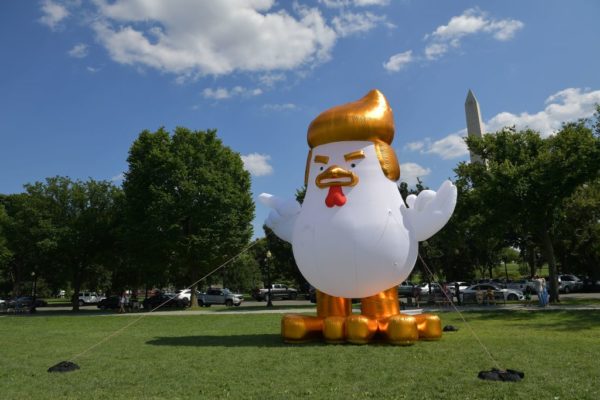Revealed: US meat lobby working to ditch chlorinated chicken ban in UK trade talks
Members of Congress sign letter calling for ‘unscientific ban’ to be ‘resolved once and for all’, as negotiations begin

A powerful lobby group representing the United States’ largest chicken producers is working with allies in Congress to demand that a post-Brexit trade deal eliminates the UK’s ban on chlorinated chicken imports, Unearthed can reveal.
Ahead of the opening round of trade talks this week, 47 members of congress wrote to the Trump administration’s top trade official on March 11 requesting that he “resolves this unscientific ban once and for all”.
The news comes after reports that UK trade secretary, Liz Truss, is preparing to slash tariffs on imports of agricultural products from the US – leading to fears that US meat that has been reared with lower welfare and food safety standards could flood the UK market.
Talks between the US and UK formally began last week, with both parties reportedly keen to secure some kind of trade agreement before November’s presidential elections.
The letter, which was spearheaded by a group of Congressional Representatives with close ties to major poultry producers, will increase the pressure on US negotiators to make chlorinated chicken a key issue in the talks, not least because trade deals negotiated by the White House can be blocked by Congress.
The prospect of the UK weakening its food and animal welfare standards to secure a trade deal with the US has become one of the most controversial issues surrounding the talks.
In a vote on an amendment to the agriculture bill earlier this week, a significant number of Tory MP’s voted against the party whip in an effort to ban chlorinated chicken and hormone-fed beef from coming into the UK.
US food and environmental standards are generally considered weaker than the EU’s. Brussels takes a precautionary attitude to environmental and food policy, while the US takes a risk-based approach.
This means that some practises that are currently banned in the UK are accepted in the US. For example, American food producers can get away with having small quantities of “extraneous materials”, including “rodent filth” and “insect fragments”, in their products.
The US-permitted practise of dowsing chicken carcasses in chlorine and other microbial washes to kill bacteria is controversial because it can be used to compensate for poor animal welfare and hygiene practices in the supply chain.
But the European ban has become a red line issue for US agricultural interests – including the powerful National Chicken Council (NCC), which represents America’s largest chicken producers including giants, Tyson Foods and Pilgrims.
The NCC works closely with the House chicken caucus, a formal grouping of congressional representatives, which represents the industry’s positions in Washington DC and coordinated the letter.
The trade group collaborated with chicken caucus co-chair Steve Womack on the letter – supplying its endorsement for a press release sent out by the congressman and publicising the initiative on its website.
Of the 47 members of congress who signed the letter to the US trade representative, 29 have taken money in the form of campaign donations from the NCC since 2016, according to an Unearthed analysis of data collated by the non-profit Open Secrets. In total, these representatives received $287,500, with Womack alone taking in $27,500.
An NCC spokesperson told Unearthed: “We want ‘US chicken’ to be included in any trade deal, as does our government. Very few, if any, processing plants use chlorine any more.”
Sam Lowe, a trade policy expert and senior fellow at the Centre for European Reform explained: “Getting rid of the EU’s ban on using antimicrobial washes to clean chicken carcasses has been a long term objective of the US and it’s producers – there is no reason to think it would drop the demand when it comes to trade negotiations with the UK.”
But agreeing to allow in US chlorine-washed chicken could also jeopardize ongoing talks with the EU.
Back in October, Unearthed reported on a leaked memo from the Department for Environment, Food and Rural Affairs (Defra) which warned that efforts to accommodate the US on food standards would jeopardise the UK’s chances of securing a meaningful deal with the EU, by far the UK’s biggest trading partner.
The UK government has always insisted that Brexit will not see a weakening of the country’s food and environmental laws. However, senior figures in the Conservative Party have played down the risks of products like chlorinated chicken, while talking up the opportunities of securing a deal with the US.

